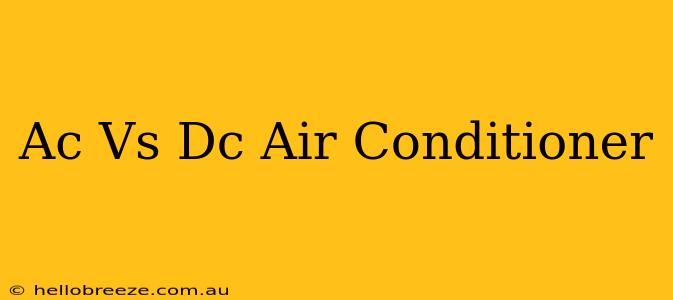Choosing the right air conditioner can be a daunting task. With advancements in technology, you now have a choice between AC and DC air conditioners. This comprehensive guide will break down the key differences between AC and DC air conditioners, helping you make an informed decision based on your specific needs and preferences.
Understanding AC and DC Power
Before diving into the specifics of air conditioners, let's quickly review the fundamental difference between alternating current (AC) and direct current (DC) electricity.
-
AC (Alternating Current): The current periodically reverses direction. This is the standard power supply used in most homes and businesses worldwide. AC power is efficient for long-distance transmission.
-
DC (Direct Current): The current flows in only one direction. DC power is becoming increasingly prevalent with the rise of renewable energy sources like solar panels. It's generally more efficient for use in devices.
AC vs DC Air Conditioners: A Detailed Comparison
Now let's explore how these power differences impact air conditioner performance and efficiency.
Energy Efficiency:
-
DC Air Conditioners: Generally boast higher energy efficiency compared to their AC counterparts. This is because DC motors offer more precise speed control, allowing the compressor to operate more efficiently at varying cooling loads. This translates to lower energy bills and a smaller carbon footprint. Look for the Energy Star rating to compare efficiency levels.
-
AC Air Conditioners: While traditional AC air conditioners have improved significantly in recent years, they are typically less energy-efficient than DC models, especially older models.
Compressor Technology:
-
DC Air Conditioners: Often utilize inverter technology coupled with DC brushless motors. Inverter technology allows the compressor to modulate its speed based on the cooling demand, leading to precise temperature control and energy savings.
-
AC Air Conditioners: Traditionally employ fixed-speed compressors. These compressors run at full speed regardless of the cooling need, resulting in energy waste and less precise temperature control. Some newer AC units are incorporating variable-speed compressors to bridge this gap.
Noise Levels:
-
DC Air Conditioners: Due to the smoother operation of DC motors, DC air conditioners are typically quieter than AC units. The absence of sudden on/off cycles contributes to a more peaceful environment.
-
AC Air Conditioners: Traditional AC units can be noisy, particularly older models with fixed-speed compressors. The constant humming and abrupt starts and stops can be disruptive.
Cost:
-
DC Air Conditioners: Typically have a higher initial purchase price compared to AC units. However, the long-term energy savings can offset this higher initial investment.
-
AC Air Conditioners: Generally have a lower upfront cost.
Lifespan:
-
DC Air Conditioners: Often have a longer lifespan due to the reduced wear and tear on the components resulting from the precise speed control of the DC motor.
-
AC Air Conditioners: While still durable, AC units may have a shorter lifespan compared to DC units due to the constant full-speed operation of the compressor.
Which Type is Best for You?
The best choice depends on your priorities:
-
Prioritize Energy Efficiency and Quieter Operation: Choose a DC air conditioner. The long-term cost savings and improved comfort make it a worthwhile investment.
-
Prioritize Lower Upfront Cost: An AC air conditioner might be a more suitable option, especially if energy efficiency is not a primary concern.
-
Consider the Climate: In hotter climates where cooling demands are high, a DC inverter air conditioner will provide significant advantages in energy efficiency and comfort.
In conclusion, while both AC and DC air conditioners effectively cool your space, DC air conditioners generally offer superior energy efficiency, quieter operation, and longer lifespan. Weigh your budget, cooling needs, and long-term goals to make the best decision for your home or office. Remember to always consult with a qualified HVAC technician for professional advice and installation.

